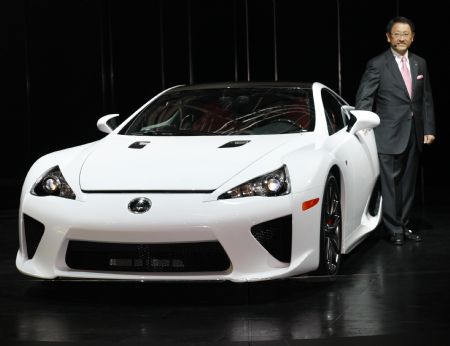Tokyo Motor Show Pushes Environmental Envelope
Polically Driven
Japanese Prime Minister Yukio Hatoyama has pledged to cut the nation's CO2 emissions by 25 percent from 1990 levels by 2020, a welcome (and well-timed) initiative in the run-up to December's Copenhagen environmental summit.
The Democratic Party of Japan (DPJ) embraces far more progressive positions on the environment than its predecessor, the Liberal Democratic Party (LDP), more than tripling the 8 percent cuts it pledged.
The DPJ's pledge, provided it's followed through and it's implementation isn't a fiscal sacrifice that outweighs the environmental positives, is an opportunity for Japan to demonstrate real leadership on a crucial global issue -- as opposed to the real rhetoric of its former government.
 |
|
Toyota Motor Corp President Akio Toyoda speaks during the unveiling of the Lexus LF-A super sports car at the 41st Tokyo Motor Show in Chiba, east of Tokyo October 21, 2009.[Xinhua/Reuters Photo] |
Japan is getting to grips with further embracing a 'greener' lifestyle, with extensive recycling and widespread residential use of solar energy panels. The government is subsidizing household adoption of eco-friendly hydrogen fuel cells that generate electricity and heat water. Solar power generation is expanding now and the government has reinstated a subsidy providing up to 500,000 yen ($5,400) to offset installation costs for households. Homebuilders are now much more conscious about energy efficiency, and advertising for a myriad of electrical appliances all wax lyrical about their eco-friendly technology.
With the DPJ initiatives to slash highway fees, we can expect other incentives and subsidies to follow to encourage the nation to get back behind the wheel (and start buying cars again -- environmentally friendly ones). Further tax breaks on fuel- efficient cars are most definitely on the cards as an immediate and ongoing lure for Japanese consumers and in a bid to reenergize an extremely sluggish market.
The chairman of Japan's key automaker group, the Japan Automobile Manufacturers Association (JAMA), Satoshi Aoki, has commented that current tax breaks for fuel-efficient cars have been effective in boosting sales and has urged the new government to maintain them until March 2012 as previously planned.
"The eco-car tax breaks have undoubtedly pushed up the share of environmentally-friendly cars in Japan's auto sales, so this is a that has contributed to the environment. It has also contributed strongly as an economic measure, so I hope it will continue for three years as initially planned," Aoki said.
So while global motor shows like Tokyo's exhibit 'concepts' and eco-technology, much of which is still in the pipeline and has yet to make it's way to the factory lines for mass-production, it is only a matter of time... and cost -- in fact the two are inextricably linked. Over time, technology costs drop, as Toyota has proven with its Prius.
Toyota launched the G21 Project, which ultimately gave birth to the popular Prius, which debuted on the roads of Japan in 1997 and is the first ever mass-produced hybrid vehicle (it's powered by a regular gasoline engine and a permanent magnet AC electric motor and nickel-metal hydride battery pack). According to the United States Environmental Protection Agency, the 2008 Prius is the most fuel-efficient car sold in the US. The UK's Department for Transport also posted similar reports. Today the third generation Prius is Japan's top selling car, with Honda's cheaper hybrid, Insight, also a big hit with a new generation of drivers who flaunt their 'eco badges' like designer brands.
As the tax-breaks increase in Japan, so will eco-brand image- consciousness. It is about the environment, but this is Japan -- it's about image too.
 0
0 







Comments